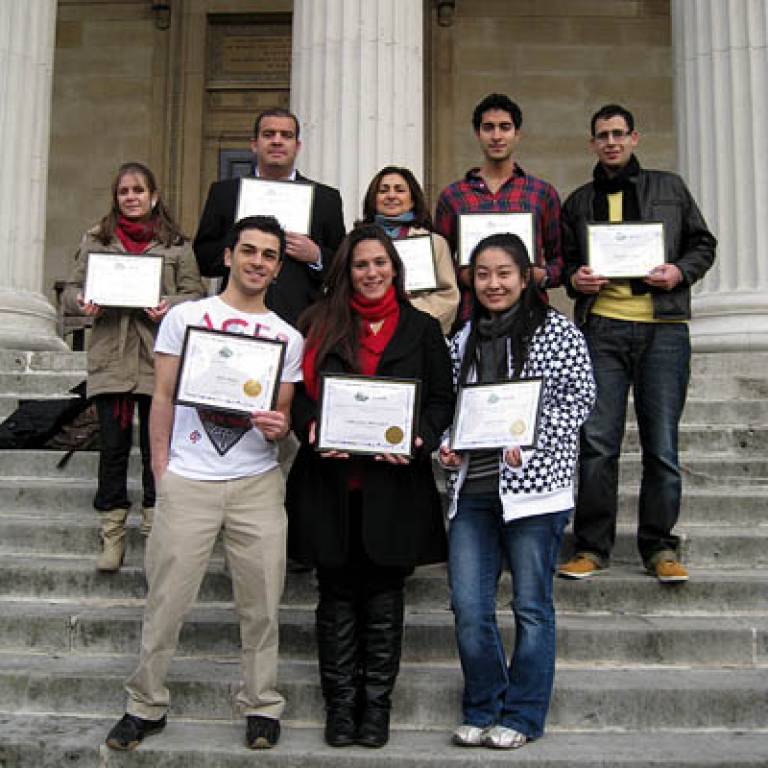Synthetic biology team take gold
6 December 2010
A UCL student team has won gold in a prestigious synthetic biology design competition for undergraduates across the globe.

Team advisor Dr Darren Nesbeth (UCL Biochemical Engineering) describes how the winning entry could reduce the cost of manufacturing medicines, and what the students gained from the experience.
"A UCL student team has won gold in a prestigious synthetic biology design competition for undergraduates, competing against 128 other leading universities across the globe.
The team, drawn from a number of departments at UCL, won the gold medal at the International Genetically Engineered Machines (iGEM), an annual, undergraduate synthetic biology design competition run by the Massachusetts Institute of Technology (MIT).
The triumph built on UCL's success in 2009, when the student team took silver the first year UCL entered the competition.
The UCL team - called 'Project Hypoxon' - set out to reduce the financial and environmental cost of manufacturing medicines by genetically re-programming the E. coli cells in which many modern medicines are made.
These E. coli cells are currently controlled by the addition of chemicals which trigger drug production. Project Hypoxon aimed to allow the cells to be triggered without the need to add chemicals by simple changes in their environment, such as low oxygen or changed temperature, by constructing a synthetic gene network in the cells.
This technology could ultimately be deployed in commercial E. coli strains commonly used in drug manufacturing, in order to boost productivity and reduce the cost of drug production.
UCL Biochemical Engineering sponsored a multidisciplinary team comprising:
- Biochemical Engineering students: Ali Ali-Albazergan, Arif Abed, Carolina Moujaes, Elena Pallari and Omar El Saidi
- Research Department of Structural & Molecular Biology students: James Brown, Mariam Awlia and Xiang Chen
- Science and Technology Studies student Veronika Raszler and
- external student David Bennett from Central Saint Martins College of Art and Design.
The team worked throughout the summer using the industrial biomanufacturing facilities at the Advanced Centre for Biochemical Engineering (ACBE) before the final iGEM jamboree event at MIT in November.
Team member Omar El Saidi said: 'We are all delighted at our success, and really enjoyed the opportunity to work on a truly multidisciplinary project that has real-world relevance. I personally really enjoyed building the team's website.'
Carolina Moujaes is now in the final year of a Biochemical Engineering MEng. She reflected: 'iGEM 2010 provided a great opportunity to develop real hands-on practical fermentation skills. Collaborating with students and advisors from art, design and social sciences background was also a real eye-opener and has made me aware of the different perspectives people have on synthetic biology, engineering and science in general. I also found the Jamboree at MIT fascinating with over 2000 international students from different countries bringing in novel ideas and making people aware of the new science of synthetic biology.'
I supported Project Hypoxon along with Professor Eli Keshavarz-Moore from UCL Biochemical Engineering; Professor John Ward of the Research Department of Structural & Molecular Biology; and Dr Jane Gregory from UCL Science and Technology Studies. Additional advice and creative input was also provided by the artist Giulia Ricci, a recent alumna of the UCL Slade School of Fine Art.
As well as research, iGEM teams are encouraged to explore the possible societal impacts of synthetic biology. iGEM is a great opportunity for UCL to encourage students from different departments and faculties to come together and work on a project. By focusing on today's biochemical engineering challenges we also enable UCL iGEM teams to take their projects out into the wider world of the general public. Recruitment for iGEM 2011 is already underway and we will finalise a roster by mid December.
Financial support for UCL's iGEM 2010 team was provided by Eli Lilly, Lonza Biologics and the Health Protection Agency, which are all partners in the Innovative Manufacturing Research Centre programme within UCL Biochemical Engineering; and King Abdullah University of Science and Technology."
For information about iGEM 2011, contact Dr Darren N. Nesbeth.
Image: The UCL iGEM team on the Portico steps. Back row, from left: Elena Pallari, Darren Nesbeth, Eli Keshavarz-Morre, Ali Ali-Albazergan and Omar El-Saidi; front row, from left: Arif Abed, Carolina Moujaes, Xiang Chen
UCL context
The Innovative Manufacturing Research Centre at UCL focuses on improving and enabling manufacture of so-called 'next generation' medicines such as potent protein products, gene therapy vectors and new classes of vaccine. Its work also has major implications for fields as diverse as biofuels and regenerative medicine.
The UCL Advanced Centre for Biochemical Engineering is a globally recognised centre of excellence in linking bioscience insight to understanding of bioprocesses, enabling research discoveries to be directly translated into real healthcare outcomes. It has invested over £30 million in new facilities in recent years and has its own pilot plant facility for the scale verification of bioprocess performance.
 Close
Close

